15 Must-Read Books For Every Entrepreneur
Books are often neglected in our society and that’s due to an increasing amount of other sources that are available to us. Books play an integral part in every wo(man)’s entrepreneurship journey. They teach us valuable lessons that guide us through this so-called entrepreneurship journey.
These are our top productivity books on how to figure out your purpose, how to work smarter not harder, and guidance on how to follow your dreams.
1. How to Win Friends and Influence People
– Dale Carnegie
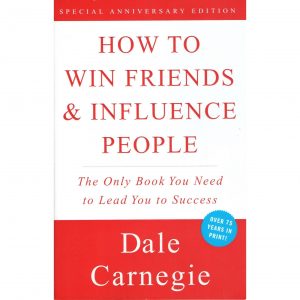
Let’s start with one of my favorites. It does not matter what business you are in, How To Win Friends & Influence People is a must-read by everyone.
Business thrives of people, the only way to have a successful business is to build strong relationships.
Carnegie teaches the psychology of communication and how to leverage relationships.
His lessons and techniques on how to win over people will prepare you for anything that life throws your way.
Here are Carnegie’s six ways to make people like you:
Become genuinely interested in other people.
Smile.
Remember that a person’s name is to that person the sweetest and most important sound in any language.
Be a good listener. Encourage others to talk about themselves.
Talk in terms of the other person’s interests.
Make the other person feel important – and do it sincerely.
2. The 4-Hour Work Week
– Timothy Ferriss
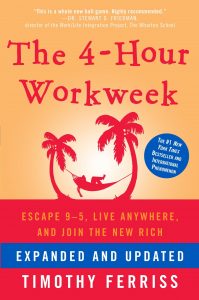
You can read a book from cover to cover but without applying the knowledge learned nothing will ever change.
This book has a ton of valuable information on how to work more efficiently and helpful tips for building the life you’ve always wanted.
Every person is different, ultimately you have to decide what big ideas from The 4-Hour Work Week work the best for you.
Doing something unimportant well does not make it important. 2. Requiring a lot of time does not make a task important.
3. The 7 Habits of Highly Effective People
– Stephen R. Covey
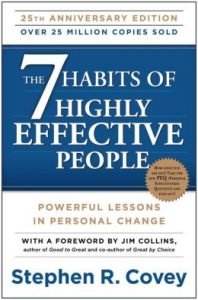
The 7 Habits of Highly Effective People is yet another phenomenal self-development book that provides a framework for personal and professional success.
There isn’t a universal take-home message here; it really depends on the reality of your own life and where you’re at. Even re-reading it again at a different point in life is going to result in a vastly different interpretation of the materials within the covers.
This book is hands down filled with material that will continue to be relevant in years to come.
Covey introduces the Four Quadrants of Time Management:
- Quadrant I: Urgent, Important
- Quadrant II: Not Urgent, Important
- Quadrant III: Urgent, Not Important
- Quadrant IV: Not urgent, Not Important
Effective people stay out of Quadrants II and IV because, urgent or not, they aren’t important. They also shrink Quadrant I down to size by spending more time in Quadrant II.
4. Think and Grow Rich
– Napoleon Hill
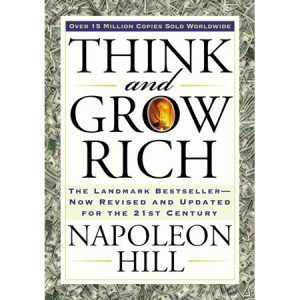
Think and Grow Rich is an international bestseller.
There have been over ten million copies sold to entrepreneurs like yourself.
Hill teaches us that thoughts, mindset, and believing in yourself translates into the real world. Hill explains how the mind works and the impact it has on the life we live.
I had learned, from years of experience with men, that when a man really desires a thing so deeply that he is willing to stake his entire future on a single turn of the wheel in order to get it, he is sure to win.
5. The Alchemist
– Paulo Coelho
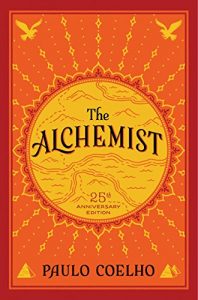
The Alchemist tells a story about a boy who goes on a journey, following the boy’s journey you will learn lessons that can be applied to your life. The theme of the book is to follow your heart to pursue your biggest dreams. You are never too young or too old to understand that we should listen to our heart and chase after our dreams.
The secret of life, though, is to fall seven times and to get up eight times” The Alchemist.
6. Big Magic
– Elizabeth Gilbert
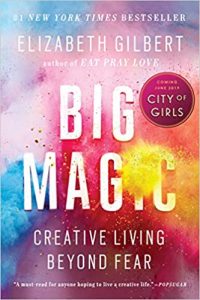
Big Magic, a book that you should read if you are experiencing a creative block. Not all ideas come to us at once, this book gives reassurance that it’s okay to have setbacks and creative roadblocks. This book will inspire you to work past all the glitches in new, improved, and creative ways.
It’s a simple and generous rule of life that whatever you practice, you will improve at.
7. Thinking Fast and Slow
– Daniel Kahneman
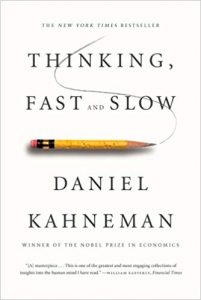
Thinking Fast and Slow teaches you how to control your behavior and actions in a way that impacts your life in the best way.
Kahneman is a psychologist and holds a Nobel Prize in Economics for his work. He goes into detail of trusting your gut feeling and how to act more mindfully to make better professional and personal decisions.
According to 4 Minute Books, the book is recommended for: The 17 year old with an interest in biology and neuroscience, the 67 year old retiree with a secret passion for gambling, and anyone who’s bad at mental math.
If you care about being thought credible and intelligent, do not use complex language where simpler language will do.
8. Emotional Intelligence 2.0
– Travis Bradberry
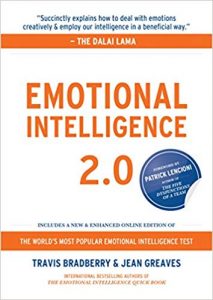
Emotional Intelligence 2.0 is a great book to help you understand how to effectively manage people and business relationships. This book is recommended for anyone who wants to take their business or career to the next level.
Greeting someone by name is one of the most basic and influential social awareness strategies you can adopt. It’s a personal and meaningful way to engage someone. If you have a tendency to withdraw in social situations, greeting someone by name is a simple way to stick your neck out; using someone’s name breaks down barriers and comes across as warm and inviting. Even if you are a social butterfly, greeting people by name is a strategy to live by.
9. Start with Why
– Simon Sinek
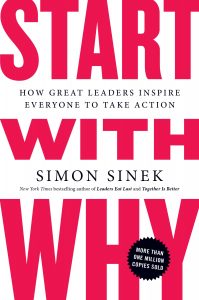
Start with Why is a book for you if you are struggling to figure out what you are meant to be doing. Sinek explores the concept of purpose and sense of belonging to motivate others.
A strong WHY offers reasons for people to buy. For example, Steve Jobs and Steve Wozniak created Apple to start a revolution, not sell computers. Apple stands for thinking differently, for challenging status quo, for simplifying technology so individuals could have the same power to create as big companies. Its earliest fans and supporters weren’t just buying computers – they were buying what Apple stood for.
Everyone has the need to belong, that’s why we look for partners to start families.
In order to have a successful company, figure out WHY you run the business you run.
Leadership requires two things: a vision of the world that does not yet exist and the ability to communicate it.
10. Building a StoryBrand
– Donald Miller
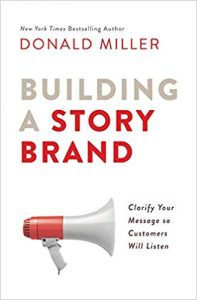
As an entrepreneur, your goal is to make your business stand out. This book is packed with useful information on marketing tactics and how to capture your audience’s attention in a noisy world. Stories are worth thousands of words, so let’s begin telling your story.
In every line of copy we write, we’re either serving the customer’s story or descending into confusion; we’re either making music or making noise.
11. The Miracle Morning
– Hal Elrod

If you are a morning person, The Miracle Morning is the book for you. This is an inspiring story of a person who overcame many obstacles in his life while making the best out of every situation.
If you are at a stage where little inspiration would come handy, pick up The Miracle Morning and start reading.
Always remember that where you are is a result of who you WERE, but where you go depends entirely on who you choose to be, from this moment on.
12. The Lean Startup
– Eric Ries

As an entrepreneur, you will make mistakes. Mistakes are good but what if you could avoid some of the most common mistakes to save some time?
This book provides readers with valuable ideas and real-world examples to avoid the most common startup mistakes.
We must learn what customers really want, not what they say they want or what we think they should want.
13. Zero to One
– Peter Thiel
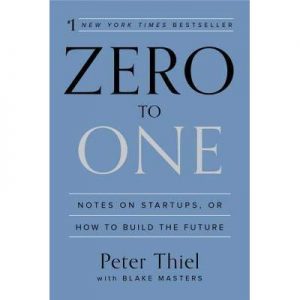
You should read this book if you want actionable, research-driven guidance on how to build a successful and sustainable business.
Hundreds of people have started multiple multimillion-dollar businesses. A few, like Steve Jobs, Jack Dorsey, and Elon Musk, have created several multibillion-dollar companies. If success were mostly a matter of luck, these kinds of serial entrepreneurs probably wouldn’t exist. In January 2013, Jack Dorsey, founder of Twitter and Square, tweeted to his 2 million followers: “Success is never accidental.
14. Grit
– Angela Duckworth
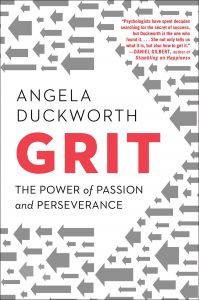
In this book, Angela explains why passion and perseverance are far more important than talent. Angela examines the human potential and what we need to succeed.
It soon became clear that doing one thing better and better might be more satisfying than staying an amateur at many different things.
15. The E Myth Revisited
– Michael E. Gerber
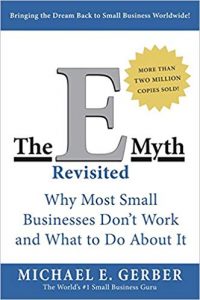
The author of The E Myth digs into what you need to run a successful business.
Being a great baker, painter or writer, does not make you good at running a business in that industry. These are two entirely different things. In fact, I just recently learned that being a good writer doesn’t even make me a good freelancer.
When you run your own business, you are much more than an artist – you become everything (a point of contact, accountant, and a marketer).
Gerber breaks down how to start thinking about your business since day one to achieve long-lasting success.
the Entrepreneurial Model has less to do with what’s done in a business and more to do with how it’s done. The commodity isn’t what’s important—the way it’s delivered is.
Pick up a book or two…
Use this list to learn a thing or two. Knowledge is a powerful tool to enrich your creativity, improve thinking and productivity skills.


